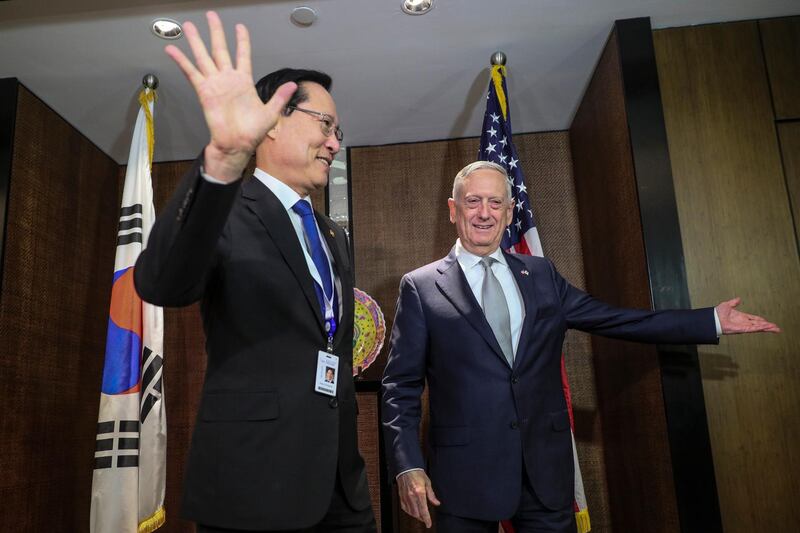A Chinese general on Saturday lashed out at "irresponsible comments" on Beijing's military build-up in the South China Sea after the US defence chief accused China of intimidation and coercion in the disputed waters.
"Any irresponsible comments from other countries cannot be accepted," Lieutenant General He Lei said at the Shangri-La Dialogue in Singapore.
It came just hours after US Defence Secretary Jim Mattis told the security summit that China's military build-up and deployment of weapon systems in the contested sea was aimed at intimidating its neighbours.
Speaking at a high-profile security summit in Singapore less than two weeks before President Donald Trump is due to meet North Korean leader Kim Jong Un, the Pentagon chief also said the US military continues to support diplomats pushing for the "complete, verifiable and irreversible" denuclearisation of the Korean peninsula.
Secretary Mattis said Beijing had deployed a range of military hardware including anti-ship missiles, surface-to-air missiles and electronic jammers across the South China Sea, where it has built islets and other maritime features into hardened military facilities.
Beijing has also landed heavy bombers on Woody Island in the Paracel Islands.
"Despite China's claims to the contrary, the placement of these weapon systems is tied directly to military use for the purposes of intimidation and coercion," Mr Mattis told the Shangri-La Dialogue.
He also blasted Chinese President Xi Jinping for reneging on a 2015 promise made at the White House that Beijing would not militarise the island features in the South China Sea.
Mr Mattis' address in Singapore was the second time he had attended the summit since becoming Pentagon chief.
__________
Read more:
After cancelling, Trump and Mattis now see 'good news' on Korea summit
Surprise meeting between Korean leadership revives hope for Trump summit
Comment: Kim Jong-un has no incentive to denuclearise. The sooner Trump realises that, the better
__________
He returned to a theme that he and other senior US officials have hammered since President Trump took office - that America is here to stay in the Asia-Pacific region and that allies should stick with Washington instead of aligning with Beijing.
But the message of inclusivity, cooperation and working with allies might be a tougher sell for Secretary Mattis, who is generally popular on the international scene, after his boss this week imposed metals tariffs on some of America's closest allies in the name of "national security".
Washington Post columnist Josh Rogin asked Mr Mattis whether he thought it was unproductive for the US president to pick fights with allies on trade.
"Certainly we have had some unusual approaches, I'll be candid with you," Mr Mattis replied.
"But I'm reminded that so long as nations continue dialogue, so long as they continue to listen to one another and to pay respect to one another, nothing is ever based on one decision."
In a dig at China, which the Pentagon has accused of using "predatory" economics to exploit neighbours, Mr Mattis said the US supports the peaceful resolution of disputes, "free, fair and reciprocal trade and investment" and adherence to international rules and norms.
Despite frequent warnings from Washington about China's rising might and the pitfalls of its "Belt and Road" global infrastructure initiative, Beijing has faced few consequences for its South China Sea build-up and sweeping territorial claims.
One modest exception came last week when the Pentagon disinvited China from biennial maritime exercises in the Pacific. Mr Mattis characterised this action as an "initial response".
But "there are much larger consequences in the future when nations lose the rapport of their neighbours," he warned.
"They believe that piling mountainous debts on their neighbours and somehow removing the freedom of political action is the way to engage them. Eventually these things do not pay off."
Delegates hoping for clarity on Mr Trump's intentions for a scheduled June 12 summit with North Korean leader Kim did not get much from the US Defence Secretary, though he said the issue of the permanent deployment of about 28,5000 US troops in South Korea will not be "on the table".
Mr Mattis has tried to avoid weighing in on the summit, deferring questions to the State Department and President Trump's national security team.
"On the Korean peninsula, we hold the line with our allies, supporting our diplomats who lead this effort," Mr Mattis said.
"Our objective remains the complete, verifiable, and irreversible denuclearisation of the Korean peninsula."





